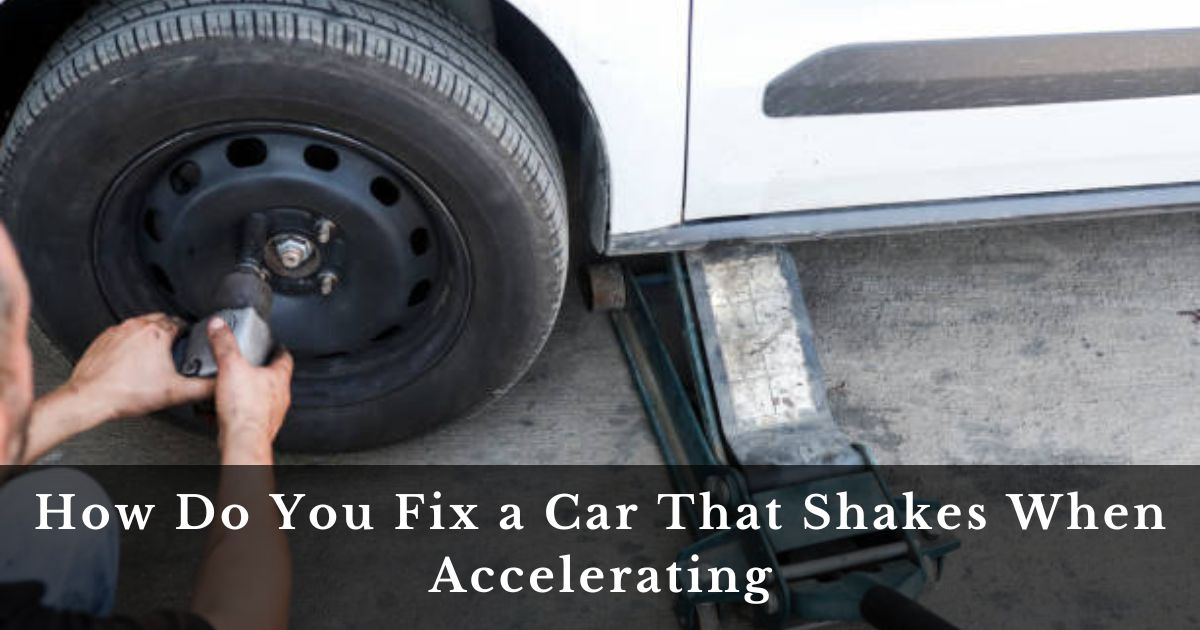How do you fix a car that shakes when accelerating, If your car shakes when you speed up, it’s not just uncomfortable—it could mean something’s wrong with your car. It’s important to fix this problem quickly to stay safe and avoid more damage. In this article, we’ll look at why your car might shake when you accelerate and how to fix it.
If you’ve ever felt your car shake when accelerating, you know it can be quite unsettling. But what causes this shaking sensation? Let’s dive into the common reasons behind it.
Why does the car shake when accelerating?
When you press the gas pedal and your car starts to shake, it’s usually a sign of some underlying issues. These issues can range from simple to complex, affecting various parts of your vehicle.
Common causes of the shaking
Several factors can contribute to your car shaking when you accelerate. Some of the most common ones include:
Tire imbalance: Uneven weight distribution on your tires can cause shaking.
Worn-out tires: Tires with uneven tread wear or damage can lead to vibrations.
Engine problems: Issues with the spark plugs, ignition system, or engine mounts can cause shaking.
Diagnosing the Problem
Before you can fix the shaking issue, you need to pinpoint the exact cause. Here’s how you can diagnose the problem:
Checking the tires
Tire balance and alignment: Imbalanced or misaligned tires can cause vibrations. A professional can balance and align your tires to resolve this issue.
Tire condition and wear: Inspect your tires for signs of wear, damage, or uneven tread. If needed, replace them to eliminate the shaking.
Inspecting the engine
Spark plugs and ignition system: Faulty spark plugs or ignition coils can lead to engine misfires, causing shaking. Replace these components as necessary.
Engine mounts: Worn or damaged engine mounts can allow the engine to move excessively, resulting in vibrations. Replace them to stabilize the engine.
Fixing the Issue
Once you’ve identified the problem, it’s time to fix it. Here are some solutions to consider:
Tire-related solutions
Tire rotation: Regularly rotating your tires can help distribute wear evenly, reducing vibrations.
Tire replacement: If your tires are worn out or damaged, replacing them can eliminate the shaking.
Engine-related solutions
Spark plug replacement: Installing new spark plugs can improve engine performance and reduce shaking.
Engine mount replacement: Replace worn or damaged engine mounts to stabilize the engine and reduce vibrations.
Professional Help
If you’re not comfortable diagnosing or fixing the issue yourself, it’s to consult a mechanic. They have the expertise and tools to identify and resolve the problem effectively.
When to consult a mechanic
If you’ve tried diagnosing the issue but still can’t pinpoint the cause, or if the shaking persists despite your efforts, it’s time to seek professional help.
What to expect during repairs
When you take your car to a mechanic, they’ll likely perform a thorough inspection to determine the cause of the shaking. Depending on the issue, they may recommend tire balancing, alignment, engine repairs, or other solutions.
Preventive Measures
To avoid experiencing shaking when accelerating in the future, consider these preventive measures:
Regular maintenance
Scheduled inspections: Regularly inspecting your tires, engine, and other components can help identify and address potential issues early on.
Routine maintenance: Following your vehicle’s maintenance schedule for oil changes, filter replacements, and other services can keep it running smoothly.
Driving habits to avoid shaking
Smooth acceleration: Avoid rapid acceleration and deceleration, as it can strain your engine and tires, leading to shaking.
Avoid potholes and rough roads: Driving over uneven surfaces can cause damage to your tires and suspension, resulting in vibrations.
Experiencing shaking when accelerating can be a sign of various issues affecting your car. By understanding the common causes and following the steps to diagnose and fix the problem, you can ensure a smoother and safer driving experience.
FAQs
What causes a car to shake when accelerating?
Common causes include tire imbalance, worn-out tires, and engine problems like faulty spark plugs or engine mounts.
How can I diagnose the shaking issue myself?
You can start by checking your tires for imbalance, wear, or damage and inspecting the engine for issues like faulty spark plugs or engine mounts.
Can tire balancing and alignment fix the shaking?
Yes, having your tires balanced and aligned can often resolve the shaking issue caused by tire-related problems.
How often should I rotate my tires to prevent shaking?
It’s recommended to rotate your tires every 6,000 to 8,000 miles or as recommended by your vehicle’s manufacturer.
Is it necessary to consult a mechanic for shaking issues?
If you’re unable to identify or fix the problem yourself, or if the shaking persists, it’s to consult a mechanic for professional assistance.



